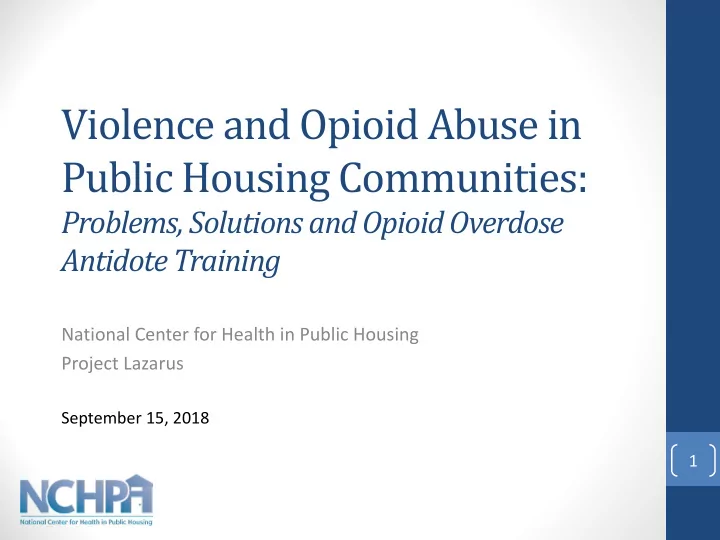

Violence and Opioid Abuse in Public Housing Communities: Problems, Solutions and Opioid Overdose Antidote Training National Center for Health in Public Housing Project Lazarus September 15, 2018 1
Agenda • Violence Background • Mental Health • Substance Abuse • Prevention Case Examples • Intervention • 3 Health Centers • Survey Mental Health Opioid Overdose • Mr. Fred Wells Brason II from Project Lazarus 2 Training
Increased Access + Quality of Care à Improved Health Outcomes Capacity Building For Health Centers Serving Residents of Public Housing ü Training & Technical Assistance ü Research ü Outreach and Collaboration 3 This project is supported by the Health Resources and Services Administration (HRSA) of the U.S. Department of Health and Human Services (HHS) under grant number U30CS09734–Public Housing Primary Care National Training and Technical Assistance Cooperative Agreement-for $608,000, and is 100% financed by this grant. This information or content and conclusions are those of the author and should not be construed as the official position or policy of, nor shouldany endorsements be inferred by HRSA, HHS or the U.S. Government.
National Center for Health in Public Housing • This project is supported by the Health Resources and Services Administration (HRSA) of the U.S. Department of Health and Human Services (HHS) under grant number U30CS09734– Public Housing Primary Care National Training and Technical Assistance Cooperative Agreement- for $608,000, and is 100% financed by this grant. This information or content and conclusions are those of the author and should not be construed as the official position or policy of, nor should any endorsements be inferred by HRSA, HHS or the U.S. Government . 4
Health Centers near Public Housing • 1,400 Federally Qualified Health Centers (FQHC)=26 million • 341 FQHCs In or Accessible to Public Housing= 2.7 million patients • 105 Public Housing www.nchph.org Primary Care (PHPC) = 609,000 patients 5
A Health Picture of HUD-Assisted Adults, 2006-2012 Adults in HUD-assisted housing have higher rates of chronic health conditions and are greater utilizers of health care than the general population. • Fair or Poor Health- 36% vs. 14% • Overweight or Obesity- 71% vs. 64% • Disabled- 61% vs. 35% • Diabetes- 18% vs. 10% • Asthma- 16% vs. 9% 6
Mental Health 7
What is the Connection? Violence Substance Mental Abuse Health 8
People who have experienced trauma from violence are… • 15 times more likely to attempt suicide • 4 times more likely to become an alcoholic • 4 times more likely to develop an STD • 4 times more likely to inject drugs • 3 times more likely to experience depression 9
Children • 26% of children will witness or experience a traumatic violent event before they turn 4 years old • 60% of youth under age 17 and have been exposed to crime, violence and abuse • More likely to be depressed, STD, obese 10
Violent Crime Rate (per 100k pop) by County 508 in PHPC counties vs. 386 national average 11
Case Study Methodology PHPCs in high crime areas Violence prevention and intervention programs Interviews and document review Identified themes 12
Research Questions ü Types of violence -gang, domestic, crime/homicide? ü Need for mental health services due to violence? ü Describe violence intervention and prevention programs? ü Successful strategies or initiatives? ü What are the expectations of community violence intervention and prevention programs? 13
Case Studies Whittier Street Health Center in Boston, MA OIC Center in Rocky Mount, NC Genesee Health Systems in Flint, MI 14
Whittier Street Health Center Boston, MA • low-income • poverty • racism • a history of neglect • feelings of community abandonment 15
To help community members cope with violence and trauma, Whittier: q Individual therapy q Spanish-speaking group for parents q Trauma Team q Intensive Family Team q Domestic Violence Coordinator q DecisionArts q Community Relation Peer Leadership 16
WYSE 2017
OIC Health Center Rocky Mount, NC • Rural • High poverty • High unemployment • High crime 18
Integrated Behavioral Health System Crisis Intervention Training (CIT) Criminal Justice System and Those in Mental Health Crisis 19
Changing the Narrative • City of Rocky Mount • Health Care Providers- local hospitals • Law Enforcement • Housing Authority • Homeless Shelter Mental Health Services Mobile Crisis Unit Law Enforcement Inpatient Setting 20
Genesee Health System Flint, MI • Low income • Economically depressed • High crime • Poverty • Abandoned Buildings 21
Mental Health Court/ Drug Court • Health care staff embedded in the court • Arrests are cross-referenced with patients with mental health issues • Big reduction in rates of recidivism 22
NARCAN Kits • 12 overdoses in one neighborhood • Mobile unit distributed kits at a church, mission, dollar store • Saved lives 23
Summary Community Urgency Holistic Diverse team Partners 24
https://www.surveymonkey.com/r/TW3XZQC Emotional and Mental Health Survey
Social Media • Follow us on Twitter https://twitter.com/NCHPHorg • Follow & Like us on Facebook https://www.facebook.com/NCHPH.org/ • Subscribe to our YouTube channel http://www.youtube.com/namgthealth 26
Contact Information q Bob Burns bobburns@namgt.com q Jose Leon jose.leon@namgt.com q Saqi Maleque Cho saqi.cho@namgt.com Handouts available 27
Recommend
More recommend